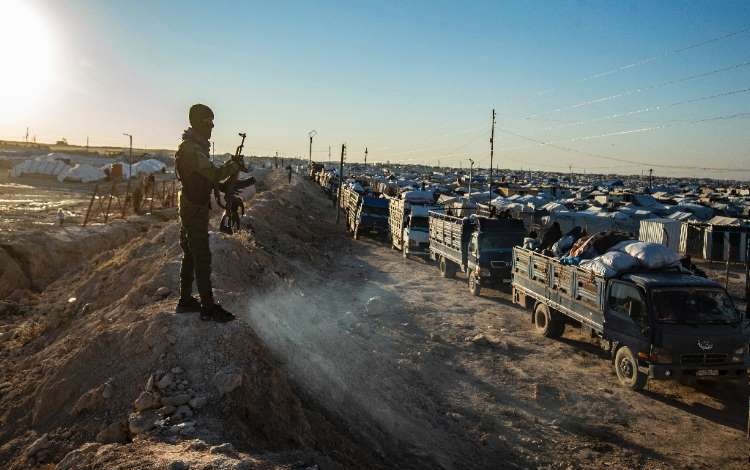An armed guard watches over the al-Hol camp in northeast Syria (Delil Souleiman/AFP)
Up to 35 British children and 15 women are being held in “barbaric” conditions as they are deprived in a “systematic way” of their UK citizenship, according to a report from the charity Rights and Security International.
The women and children are held by Kurdish authorities in northeast Syria in the al-Hol and al-Roj camps, set up for the families of Islamic State fighters and members.
The camps have been condemned by rights organizations as overcrowded, rife with illness, and unsanitary, with little running water. RSI said it sent in a researcher this year who found conditions amounting to “cruel, inhumane and degrading treatment”, and claims that 25 detainees are dying each month in al-Hol as they suffer from from malnutrition, dehydration, and hypothermia.
Read the report, “Europe’s Guantanamo”
In October, the Kurdish authorities said they would try to reduce crowding in al-Hol, which has about 65,000 occupants, by removing all non-combatant Syrians.
The UN estimates there are about 30,000 Iraqis and about 10,000 other foreigners in the complex. The majority of occupants — almost 40,000 — – are children from more than 60 countries.
See also Kurdish Authorities — We Will Remove Syrians from Al-Hawl Camp
In September, after representation from Australian officials, all of the country’s nationals were moved from al-Hol to other camps.
Turning Women and Children into Non-Citizens
The RSI report says British intelligence officials regularly enter the camps to identify UK nationals and usually withdraw their citizenship.
Earlier this week lawyers for Shamima Begum, who went to Syria at the age of 15 in 2015 and married an ISIS fighter, appealed to the UK Supreme Court. They are asking that she be allowed to participate in a legal challenge over the removal of her British citizenship.
See also Why We Are Too Emotional About Shamima Begum
Why Shamima Begum Should Be Allowed to Return to the UK
UK authorities regard British women in the camps as a national security risk, blocking their return home. The Home Office believes “there are no substantial grounds” that Begum faced “a real risk of mistreatment” during her detention in Syria.
An unknown number of British children were among a few detainees repatriated in November 2019 and September 2020.
The UK Government has repeatedly refused to say when the juveniles can come back to Britain. The charity Save the Children said in July that Home Secretary Priti Patel hadn ot responded to its letter from December 2019.
The Government has blocked any legislative order to return juveniles. In February 2017, it scrapped the Dubs Amendment which provided for return for minors from war-ravaged countries. In January 2020, the Government prevented the reintroduction of the amendment, through the Brexit Bill for the UK’s departure from the European Union.
See also UK Government Failing to Bring Back British Children from Syria
“Vulnerable to Radicalization”
Yasmine Ahmed, RSI’s executive director of Rights and Security International, summarizes:
The claim that it is safer to leave women and children in the camps flies in the face of security experts who say that the real security risk comes from leaving these women and children in the detention camps where they are vulnerable to radicalization, and where their dire conditions can serve as a recruitment tool.
Have we learned nothing from the last 20 years on the war on terror? When we place people outside the law, when we deny them rights, treat them with brutality and without humanity, we not only undermine the values we are fighting for but we make ourselves and the world less safe, not more.
Richard Barrett, former director of global counter-terrorism, for the UK intelligence service MI6, adds:
The longer they stay without proper assessment of their mental and physical health or their attitudes towards their families, communities and countries – the more unpredictable they will become. And the more difficult it will be to determine what they’re going to do.
A government spokesperson said, “Depriving someone of their British citizenship is never a decision that is taken lightly, but our priority is always to ensure the safety and security of the UK.”
The spokesperson insisted, “We have also made it clear that we are willing to repatriate orphans and unaccompanied British children from Syria where this is feasible and there is no risk to UK national security. Every request for consular assistance is considered on a case by case basis.”

